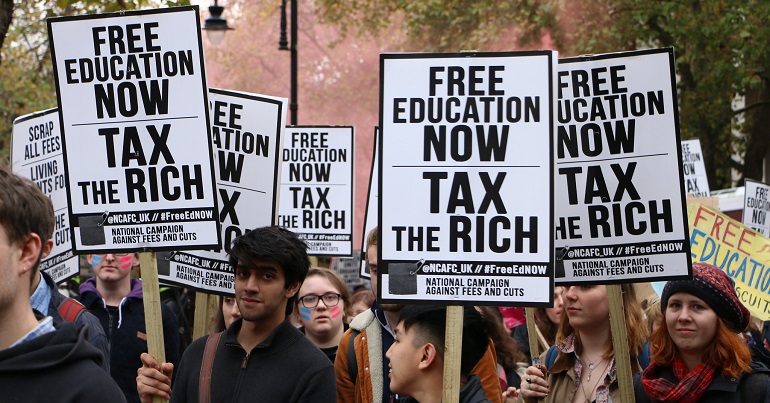Why we need fair pay on campus
by Zain Sardar (Young Greens Member Support Officer)
Antagonisms have been increasing over the last few years over the excessive pay of Vice Chancellors of Universities across the country. More and more students and staff can feel aggrieved at this; especially in a time of austerity where Higher Education as a whole has seen its funding cut by up 10 per cent and where individual academic departments have faced the axe.

The Times Higher regularly publishes league tables of Vice Chancellor’s pay, and in its latest instalment (academic year 2009-10) calculated the average salary of heads of Universities around £208, 593.1 More recently, the activist and New Statesman columnist, Laurie Penny, filmed a documentary for Dispatches entitled Cashing In on Degrees for Channel 4 which emphasised the egregious nature of top pay at Universities. She reported an increased average Vice Chancellor salary of £254, 000 per annum in the Russell Group of Universities in 2011.
Moreover, this comes at a time when renewed scrutiny has been placed upon those in the financial sector earning outrageous bonuses, as well as those top CEOs in the public sector. Reports from think tanks like the High Pay Commission show quite convincingly that the market clearly fails to regulate itself when it comes to high pay. Simply put, highly paid senior management positions are unaccountable (specifically in the case of the CEOs of banks and corporations) and enjoy little threat of being made redundant unlike ordinary workers. Secondly, cutting the pay of senior staff is seen as an admission of failure or incompetency on behalf of the institution. Conversely, there tends to be an arms race with high salaries seen as a source of credibility (like Universities all charging £9,000 as a hallmark of quality) despite the reality of the actual situation. The arms race in the private sector has been replicated in the public sector under the excuse that the public must compete with the private when it comes of senior managerial talent.
In this context Will Hutton’s report for the government on fair pay in the public sector proposes a possible maximum wage ratio between the highest and lowest paid in an institution within the public sector of 20:1. However, the majority of public sector bodies already have a smaller differential than this. Universities have the highest differential in the public sector with a ratio of 15:1 (this goes up to 19:1 in the Russell Group). It is patently obvious that Will Hutton’s suggestion (already rejected by the government) is nowhere near radical enough. The Green Party believes in a maximum wage differential in both the public and private sector of 10:1, and this is exactly the direction that the higher education sector should be moving towards.
The Young Greens believe it is about time that we focused on income equality on our campuses and this is what we intend to do with our priority campaign Fair Pay Campuses. The campaign will centre on getting the HE sector working to incrementally reduce inequalities to a 10: 1 ratio (this is the differential in the rest of the public sector). Academic evidence (specifically Kate Pickett and Richard Wilkinson’s The Spirit Level) has shown that organisations and institutions which have greater equality tend to be more productive and their workers have a greater sense of well-being. This is exactly what we want for the HE community. The campaign will kick off with five demands which students can make to their university:
(1) Will you publish the ratio between your highest and lowest paid worker?
(2) Will you commit to working towards a 1:10 ratio on campus?
(3) If you do not do so already, will you pledge to pay directly employed workers the living wage?
(4) If you do not do so already, will you ensure your contractors pay their workers living wage?
(5) Will you publish the pay of vice chancellors and senior management as recommended by Will Hutton’s fair pay review and the Localism Act?
If a university fulfils these demands it can be accredited a ‘fair pay university’ by the Young Greens in much in the same way that universities are accredited with a ‘fair trade’ status by the Fair Trade Foundation.
This vital debate on fair pay on universities campuses will be hitting NUS conference with the Young Greens Fringe (all welcome, Tuesday, 18.15-19.15, in Leopold Hotel, Library room) and the debate around our motion (Living Wage: Motion 403 Amendment C). For more information on the campaign go to: http://www.fairpaycampus.co.uk/




Leave a Reply